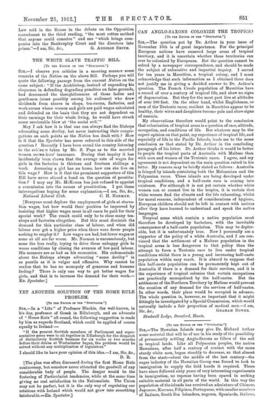THE WHITE SLAVE TRAFFIC BILL.
[TO THE EDITOR OF THE "SPECTATOR."] observe you criticise in a sneering manner some remarks of the Nation on the above Bill. Perhaps you will quote the following passage from the current Nation on the same subject : " If the Archbishop, instead of expending his eloquence in defending degrading penalties on false grounds, had denounced the thoughtlessness of those ladies and gentlemen (some possibly among his audience) who draw dividends from shares in shops, tea-rooms, factories, and work-rooms where women and girls are paid wages calculated and defended on the basis that they are not dependent on their earnings for their whole living, he would have struck some serviceable blow at the social evil.' " May I ask how it is that one can always find the Bishops advocating some devilry, but never instructing their congre- gations on such points as the Nation has dealt with P How is it that the Spectator has never referred to this side of the question P Recently I have been round the country listening to the evieen3e taken by Mr. S. Pope as to the married women outwoikers' insurance. During that inquiry it has incidentally been shown that the average rate of wages for girls in the factories is thirteen and fourteen shillings a week. Assuming a girl has no home, how can she live on this wage P How is it that the prominent supporters of this Bill have never stirred a hand on the question of prostitu- tion ? I may say Mr. McKenna has just refused to appoint a commission into the causes of prostitution. I put these interrogations hoping for some explanation.—I am, Sir, &c., [Everyone must deplore the employment of girls at starva- tion wages, but how would their position be improved by insisting that higher wages must in all cases be paid for their special work P The result could only be to close many tea- shops and factories altogether. But this must diminish the demand for this particular class of labour, and when did labour ever get a higher price when there were fewer people seeking to employ it P Low wages are bad, but lower wages or none at all are far worse. Mr. Norman is unconsciously, but none the less really, trying to drive these unhappy girls to worse conditions by closing the avenues of low-paid labour. His manners are as bad as his economics. His rodomontade about the Bishops always advocating "some devilry" is as puerile as it is vulgar and offensive. Why cannot be realize that he has no monopoly of generous and humane feeling ? There is only one way to get better wages for girls, and that is to increase the demand for their work.— ED. Spectator.]














































 Previous page
Previous page